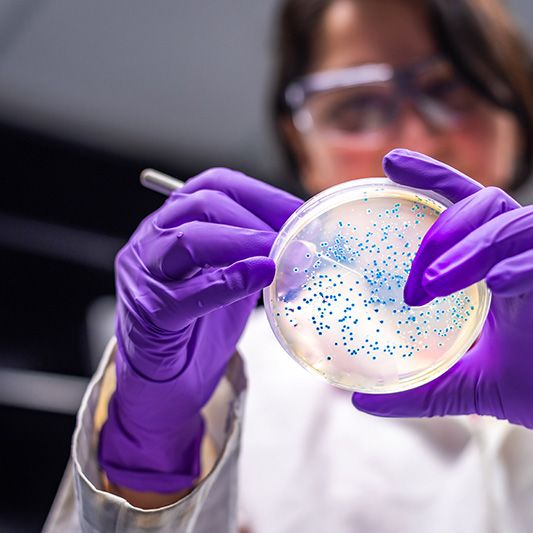Tackling antimicrobial resistance at its source
Antimicrobial resistance (AMR) is a top global health threat with ramifications that go far beyond a decreasing ability to treat disease. Research led by Professor Chris Thomas at the University of Birmingham (UoB) is targeting AMR at its source.
Plasmids are autonomous DNA elements in bacteria that often carry genes encoding properties such as virulence, colonisation and AMR. Some plasmids can transfer between bacteria, spreading these abilities even between different species.
Professor Thomas is the Scientific Director of Plasgene, a spin-out from UoB that is producing displacement technology against plasmids, exploiting fundamental knowledge of their biology.
Plasgene’s technology uses ‘good’ plasmids, called pCURE, that are engineered to displace ‘bad’ plasmids coding for unwanted properties, such as AMR. With BBSRC funding, Professor Thomas has further developed this technology to remove plasmids carrying AMR from gut bacteria. The funding resulted in a patent application covering potentiated displacement of AMR plasmids.
Recent BBSRC Follow-on funding has supported a collaboration with the Animal and Plant Health Agency, the University of Surrey, and Harper Adams University to explore applications in pigs. If successful, the technology will provide an animal, and potentially human, probiotic intervention to make infections arising from gut bacteria easier to treat.
About BBSRC
As the UK’s major public funder of world-leading bioscience research and innovation, the Biotechnology and Biological Sciences Research Council's (BBSRC) vision is to advance the frontiers of biology and drive towards a healthy, prosperous and sustainable future.
Some of the institutions key to meeting this vision are BBSRC’s strategic partnerships with universities, of which there are 15. Also mission critical are the 8 specialist bioscience research institutes that BBSRC strategically funds:
- Babraham Institute
- Earlham Institute
- Institute of Biological, Environmental and Rural Sciences (IBERS)
- John Innes Centre
- The Pirbright Institute
- Quadram Institute
- The Roslin Institute
- Rothamsted Research
Find out more about BBSRC’s work and strategic priorities by reading our Strategic Delivery Plan 2022-2025.
Contact us
Impact narratives and case studies provide an important evidence base to support the case for continued investment in world-class bioscience.
Get in touch with us to discuss BBSRC’s research outcomes and impacts or to tell us about your own:
Emma Lambourne, Senior Manager, Impact Evidence
emma.lambourne@bbsrc.ukri.org
Rosie Ford, Manager, Impact Evidence
rosie.ford@bbsrc.ukri.org
Dr Beverley Thomas, Associate Director, Evidence and Evaluation
beverley.thomas@bbsrc.ukri.org
Biotechnology and Biological Sciences Research Council
UK Research and Innovation, Polaris House, Swindon, SN2 1FL


